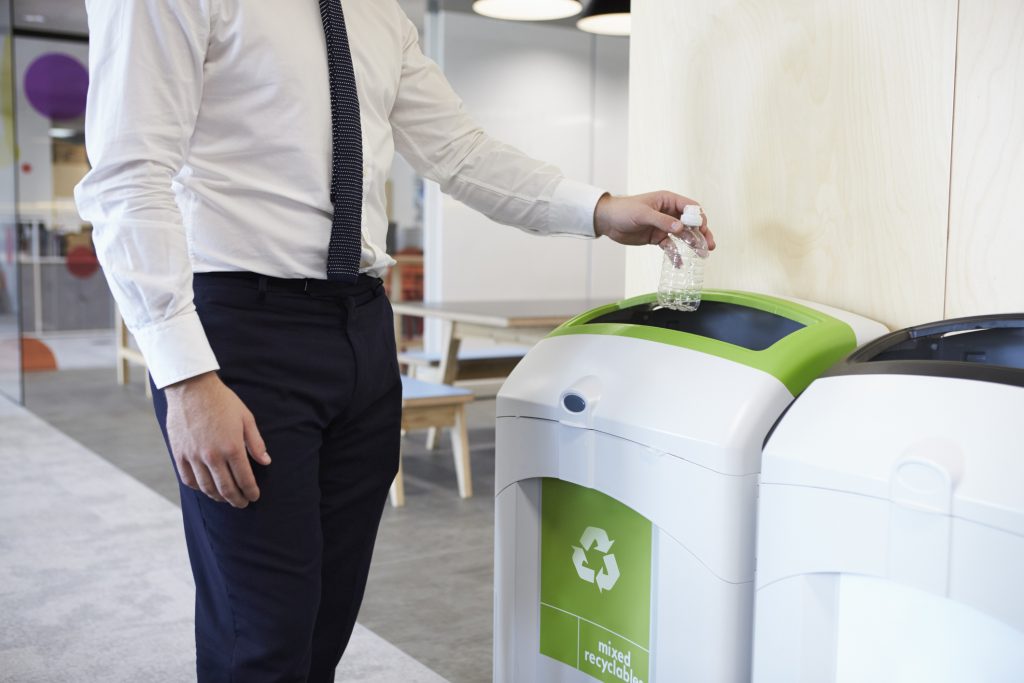When it comes to running a business, there’s no escaping the huge amounts of waste that comes with it. Whether you are involved in the manufacturing of physical products or providing services from an office, trash and trade go hand in hand.
A large proportion of business waste falls into the category of Municipal Solid Waste (MSW), or to put it another way, waste that is not recycled and is usually sent to landfill. According to the EPA, 262.4 million tons of MSW was generated in 2015 alone and as both populations and economies continue to grow, it’s almost certain that this figure is rising.
However, businesses today are beginning to change their habits as both consumers and CEOs alike take stock of our impact on the environment. It is clear that reducing all types of waste must be a priority at all stages of the chain—from production to consumption and each step in between.
Thankfully, waste reduction has many tangible benefits for businesses that go beyond simply listing figures on your sustainability report. These include cleaner working environments, reduced overheads relating to collection and disposal, improved brand image in the eyes of today’s eco conscious consumer and employee, and even the creation of jobs.
To get you started on the long road to Zero Waste, here we take a look at 15 ways you can make a difference today.
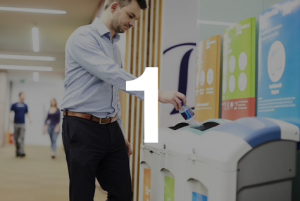
Assess, identify, and raise awareness of current waste habits
Audit your current waste output and waste management practices. This can be as simple as asking staff members to log what gets thrown out each week or bringing in a company that can take care of the process for you. Once you’ve identified what your waste consists of and how it is disposed of, you can begin to make changes to your waste management practices.

Minimize mail by removing yourself from mailing lists
While they might be something of a dying breed, there’s still plenty of flyers, brochures, and catalogs arriving on the doorsteps of businesses. You can unsubscribe from these manually by contacting the relevant company, but if you are overwhelmed by mountains of glossy paper you receive, then you can try services such as DMAchoice or OptOurPrescreen who will do the work for you.

Replace newspapers and magazines with iPads or Kindles
If you have a bunch of periodicals in your reception, or you subscribe to important industry publications, then you’ll probably find that there’s an e-book or digital magazine version available which can be added to your tablet of choice to cut down on paper waste. Often, online subscriptions are free, and enterprise subscriptions are available for multiple employees at little cost. Plus, your reception area will look much cleaner!
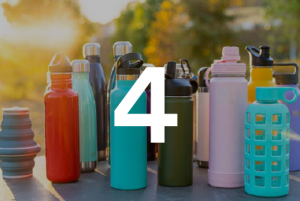
Ditch the single-use bottles (and other packaging)
If there’s one thing that everyone is aware of right now, it’s the destructive impact of single-use bottles. Luckily, it’s easy for businesses to switch to alternatives, such as the classic water cooler, or to provide staff with reusable bottles that can be refilled from the tap. Other packaging can be more challenging, particularly when it comes to food. By encouraging staff to share lunches (see our tip below) you can help make a dent in the huge amounts of single-use packaging we go through each day.

Replace plastic bags with paper or cotton
If you regularly bag up goods for customers, then you should certainly think about ditching the plastic bags. Paper bags are biodegradable; however, they can be pretty energy intensive to produce. Cotton bags even more so, but they can be used hundreds of times. There is no easy answer to this one, so the key is to ensure that bags are used multiple times through reward programs for customers that encourages them to hang on to those reusable bags.

Introduce meal plans or shared lunch days
Food waste, and the packaging associated with it, is among the largest generators of MSW. One way to tackle this type of waste is to introduce meal plans and shared lunch days. Buying in bulk is a way to cut down on packaging waste (infinitely better than single-serve microwave meals). Additionally, sharing meals usually helps to reduce food waste and can bring your staff together in constructive ways.

Introduce composting or an alternative
Whether you operate a factory with outdoor space or you work in a high-rise in Manhattan, there’s a way to compost your organic waste. Anyone with a garden can implement this ancient practice—and it can be particularly useful for hotels and restaurants. Some cities offer curbside collections for organic waste. For those that don’t, a practice called Bokashi can be useful, fermenting all of your organic waste in a plastic tub with no smell, dangerous bacteria, and very little space required. Most cities offer resources you can contract with to provide and pick up the buckets and bring the organic waste to an offsite location to turn that waste into compost.

Go (truly) paperless or use scrap paper
The dream of the paperless office has been around for a while, but for many, it has never materialized. Today, however, it’s easier than ever before, and there’s a range of steps you can take to go truly paperless including; ensuring internal comms are digital, discouraging printing in the office (or ditching the printers entirely), scanning paperwork and making digital copies, and using electronic signature software such as eversign. Finally, make sure scrap paper is used multiple times before discarding.

Buy bathroom supplies, office supplies, etc. in bulk
Buying in bulk means fewer trips to the store, less packaging, and reduced carbon emissions relating to logistics. Very often, buying in bulk also means you can reuse certain packaging, refill cleaning and bathroom supplies from larger containers, or stock the office with refillable stationery. There’s one other benefit of buying bulk that businesses are sure to love—you’ll save plenty of dollars.

Donate old electronic equipment
Businesses like to keep their technology up to date, after all, a non-working device can seriously impact productivity. That doesn’t mean that older equipment is now useless – very often it can find a new lease on life in the hands of a less demanding user. There are plenty of ways to donate e-waste; from posting adverts in your local newspaper or enlisting the help of a company for redistribution.
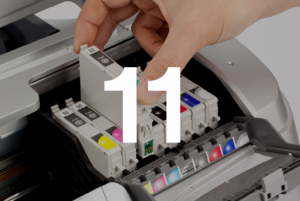
Use refillable printer cartridges and rechargeable batteries
There are around 375 million printer cartridges and around three billion batteries thrown out each year. For business who regularly use these types of consumables, switching to refillable cartridges and rechargeable batteries can make a huge difference.
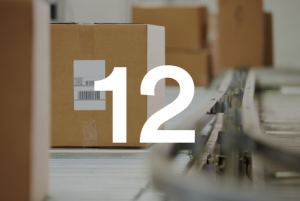
Reuse packaging materials
For mail order and e-commerce stores, the packaging used to ship goods can very quickly mount up. Smaller operations can reuse jiffy bags and other multi-material packaging, while more established businesses can switch to an eco-alternative such as Repack—a company that supplies reusable and returnable packaging solutions across the globe.
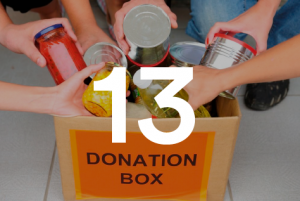
Find outlets for waste materials
Zero Waste means zero waste, so any materials that remain after production processes or manufacturing should be used whenever and wherever they can. Examples include using spent beer grain created during the brewing process as animal feed, gifting wood offcuts and other useful craft materials to artist groups or schools, and donating remaining food when your restaurant or café closes for the day.

Set up a greywater recycling system for your plants
Water wastage has long been a significant issue. However, with a few simple alterations to your plumbing system you can collect greywater to use in other areas of your building. Greywater is used water that is non-toxic i.e. from your shower, kitchen or bathroom sink. This water can be collected and used to water your plants or plumbed back into your system and used to flush your toilets. Greywater systems are surprisingly simple and cost very little to integrate.

Consider office sharing
Finally, when it comes to business related waste, sharing the burden can often make a huge difference. For smaller companies in particular, sharing an office space with independent workers and other companies means less waste when initially setting up your working space and more hands to help recycle waste created on a daily basis. Office sharing, much like car sharing, reduces the resources required to operate a functional workplace. Companies such as WeWork are leading the way in this industry, redefining the way businesses use space and resources.
Naturally, there are plenty of other ways to reduce waste that will be unique to your specific business, and much will depend on the assessment and identification of your existing waste practices. If an assessment is something your business requires help with, then contact RTS today and our LEED accredited team will be happy to arrange an audit, provide dedicated dumpsters for recycling, and arrange either regular or on-demand collections for waste to be properly disposed of.

